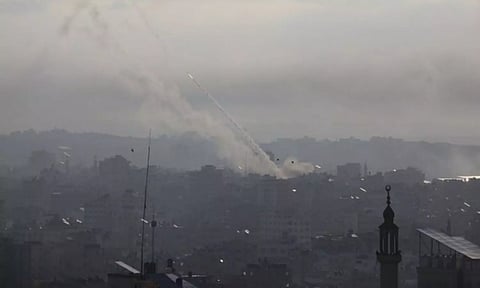

TEL AVIV: The Israel Defence Forces (IDF) said it carried out airstrikes against a series of Hezbollah sites in southern Lebanon, The Times of Israel reported.
The IDF's strikes against Hezbollah come amid the ongoing border clash between the two sides. The sites include military sites where Hezbollah members operated and other infrastructure, the IDF said.
Meanwhile, the IDF said it carried out strikes against more than 300 targets in the Gaza Strip over the past day. Ground forces carried out some of the strikes against Hamas operatives amid battles, The Times of Israel reported. It said that Air Force and Navy strikes over the past day have killed dozens of Hamas terrorists and destroyed the infrastructure of the terror group.
One of the airstrikes hit a Hamas rocket launcher used to fire long-range projectiles at Israel on Tuesday, according to the IDF. The IDF said troops of the 55th Brigade raided Hamas sites in southern Gaza's Khan Younis after they came under fire from them, The Times of Israel reported. It said soldiers found a large weapons cache, including firearms, ammunition, explosive devices and around 20 mortars.
On Tuesday, the IDF said that troops have found 1500 tunnel shafts and underground passages in Gaza since the start of the war between Israel and Hamas. According to IDF, the majority of these shafts have been found beneath schools, hospitals, mosques.
"1,500 tunnel shafts and underground passages have been exposed in Gaza by our troops since the beginning of the war. Most of these have been found beneath schools, hospitals, mosques, @UN facilities and civilian institutions. Our troops have located and destroyed hundreds of Hamas' tunnels and continue to operate to dismantle their subterranean terrorist network," IDF posted on X.
Ahmad Kahalot, Director of Kamal Adwan Hospital, has admitted that Hamas has turned hospitals into military facilities under its control. During the Israel Security Agency (ISA) interrogation, Ahmad Kahalot revealed how Hamas uses hospitals for military purposes, including hiding its operatives, conducting military activity and moving Hamas members.
Ahmad Kahalot said Hamas even brought a captured soldier to the hospital, Israel Ministry of Foreign Affairs said in a press release. Israel Defence Forces (IDF) and ISA apprehended Kahalot at the Kamal Adwan Hospital on December 12. Kahalot said he has been part of Hamas since 2010.
He said, "I was recruited to Hamas in 2010 with the rank of Brigadier General. There are employees in the hospital who are military operatives of the Izz ad-Din al-Qassam Brigades - doctors, nurses, paramedics, clerks, and staff members," according to Israel Ministry of Foreign Affairs press release.
According to Kahalot, Hamas members hide in hospitals as they consider it a safe place. He revealed that 16 employees in the hospital, including doctor, nurse, clerks, paramedic hold different positions in al-Qassam, the military wing of the terrorist organisation, The Times of Israel reported.
Kahalot said, "They hide in hospitals because for them a hospital is a safe place. They won't be targeted when they are inside a hospital."He further said, "I know 16 employees in the hospital - doctor, nurse, paramedic, or clerks... who also have different positions in al-Qassam".
He revealed that there are officers where the Hamas leader and two of the senior officials were present. He further said that the kidnapped soldier was also brought to the hospital and kept there.
"There are offices where the Hamas leader and two of the senior officials were. There's a place where the soldier was in (the kidnapped soldier). There's a place for the interrogators, internal security, and special security. All of them have private telephone lines inside the hospital," he said.